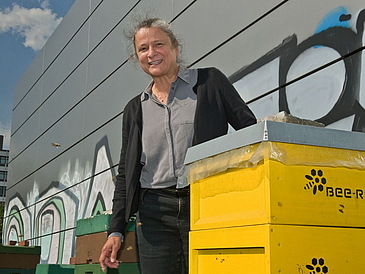Kerstin Schill, a Professor for Cognitive Neuroinformatics at the University of Bremen, was recently elected to the Senate of the German Research Foundation for a second term. In this highest body of research funding and self-administration in science, she represents the field of informatics for the whole of Germany. She must have done an extremely good job during her first term, otherwise the General Assembly would not have re-elected her. “It is a little unusual, I suppose”, she says in all modesty. “I do enjoy the work, though, and it teaches me a lot.”
A vote in the Senate
Kerstin Schill is kept constantly informed about all the projects supported by the German Research Foundation and has a vote in the 39-member Senate, which allocates funding across all the disciplines and also finances large-scale equipment. The 59-year-old has a passion for informatics and advocates a stronger role for women entering the field. “You probably have a picture in your mind of a pizza-eating male nerd”, she says jokingly. “Computer science, though, is great for women, too!” Nowadays, no subject can do without information technology: Whether we’re talking about biology, medicine, environmental or social science – everything depends on informatics.
The recruitment of future women scientists starts at an early age
Among many other things, Kerstin is the coordinator of a project called “smile”, which aims to get young girls interested in IT as soon as they enter secondary education. Several universities and institutes are supporting the project with more than 100 workshops over the coming three years. “The project gives schoolgirls the opportunity to engage with information technology in what we call smart environments”, says our computer enthusiast. For example, the young participants are able to try their hand at intelligent lighting; namely, systems that react to voice commands. The topics dealt with in the workshops are meant to relate to life in everyday situations.
Robot cooks
“I must emphasize that a little”, says Kerstin in an accent that leaves no doubt she comes from Stuttgart. She is engaged with so many topics in so many different functions and positions that she often has to say this. When reading her C.V. one can’t help but be amazed that one person can be involved in so many things: She is co-spokesperson for the Collaborative Research Center EASE (Everyday Activity Science and Engineering). Talking about this, she say “We have a robot that ‘slaves in front of the kitchen stove’ 24 hours a day and seven days a week. He (!) can already make popcorn, and it will be interesting to know which recipes he will be able to cope with by the end of the project.”
“A human is a little miracle”
Kerstin also leads the Institute for Cognitive Neuroinformatics, where researchers are working on so-called intelligent systems. “Our model is humankind; we can use all sorts of sensors and all at the same time. We can develop ideas, make decisions, learn, reach conclusions, and deal with unsafe knowledge”, she says with some reverence. In particular, the research team is interested in spatial behavior. To summarize: “We are a little miracle; we should be humble.” The institute is pursuing many partial aspects of the big picture. How do other creatures find their way around? To gain more knowledge of this aspect, there are bee hives on the doorstep. How do we see and hear? This is an approach of spatial cognition. The neuroinformatics scientist is happy that her research serves humankind. And support systems for the elderly, driverless cars or special navigation devices for persons with dementia can indeed make life easier.
Minds, Media, Machines
As Dean of the large Faculty of Mathematics/Computer Science, Kerstin Schill can rattle off the numbers: “We have the most students, 42 professors, 200 members of academic staff, and third-party funding amounting to 11 million euro a year: And the Faculty also hosts a Lichtenberg Professorship as well as a Heisenberg Professorship.” She simply has to “emphasize that a little”. Oh, and not to forget, she is also spokesperson for the University’s high-profile research area Minds, Media, Machines, which encompasses no less than five Faculties.
“This is the University for me”
Kerstin Schill came to Bremen with her husband in 2003. In those days, she often brought her son with her when she had to work in her office on the campus. He used to sit in a corner and play with cardboard boxes. “On reflection, the now 18-year-old says it was one of the best parts of his life”, says his mother. What will he one day decide to study at university? “Informatics, I fear”, she says laughingly. Kerstin Schill swapped the huge Ludwig Maximilian University of Munich to come up north to Bremen. “Just a few days after taking up my appointment, I bumped into the University President on the campus. He remembered my name and asked how I was settling in.” At that moment, she realized: “This is the University for me”. Here, people know each other and appreciate each others’ work. “There aren’t so many places like that”, she says convincingly. Since she arrived here, she has turned down several attractive calls from other universities. Professor Kerstin Schill still has many years in front of her in Bremen.

